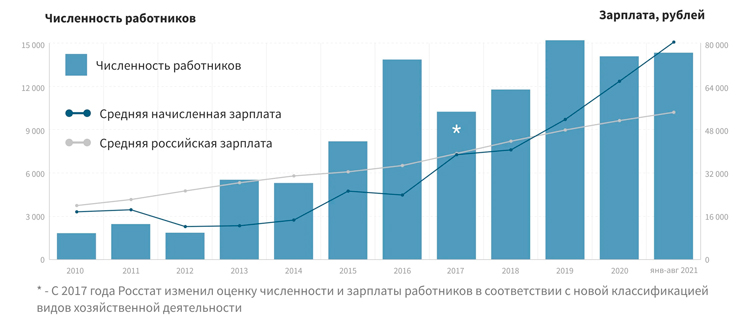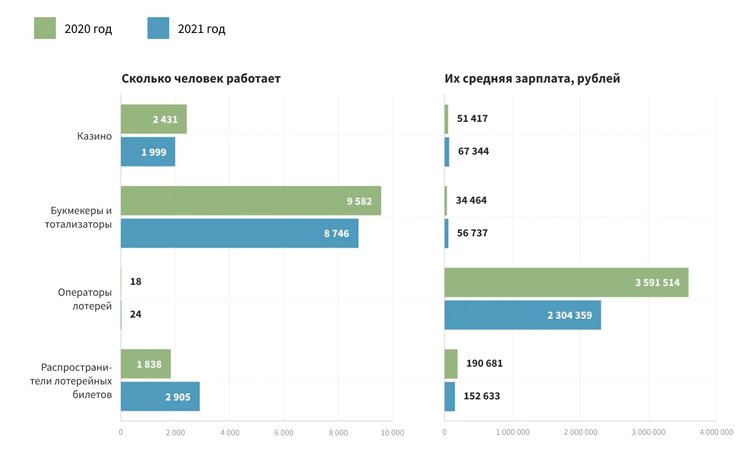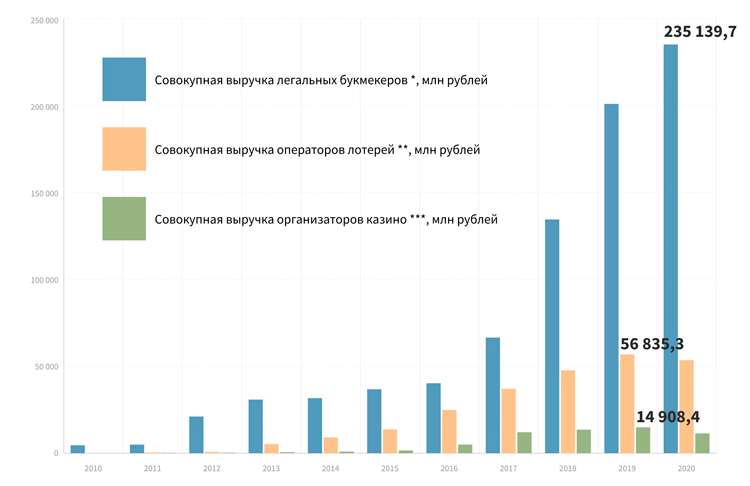
Working in the gambling industry was not previously considered prestigious. This is partly due not only to the reputation of gambling entertainment, but also to the low level of remuneration. However, over the decade the number of employees in gambling companies has increased by an average of 43% annually. In 2010, 1,832 employees were employed, and in August 2021, 14,331.
- A brief tour of the betting market in Russia
- Reasons for growth
- The secret of lotteries
- High salaries remain a myth
- Cancellation of Russian Las Vegas
- Conclusion
A brief tour of the betting market in Russia
In 2009, the government banned online casinos and imposed restrictions on land-based gambling establishments. In 2022, the gambling industry includes:
- Bookmakers’ offices.
- Land-based casinos in gambling zones (GZs).
- State lotteries.
The largest number of employees is employed in betting offices – 8750 people. For the last 10 years this sector has grown 4 times. In total, 19 legal BCs are registered on the territory of the Russian Federation.
The number of employees of land-based casinos has grown from 0 to 2000 people. Closure of gambling establishments led to the restart of the sector.
| Region | EZ | Casino |
|---|---|---|
| Altai region | “Siberian Coin | Altai Palace |
| Primorsky Krai | “Primorye” | Tigre de Cristal, “Shambala” |
| Kaliningrad region | “Amber” | Sobranie |
| Krasnodar region | “Krasnaya Polyana” | “Sochi”, “Boomerang” |
| Crimea | “Zolotoy Bereg” | (projected) |
Since 2014, all lotteries have become state lotteries – the organizers are the Ministry of Finance and the Ministry of Sport. However, management and distribution is in the hands of several private companies. They sell tickets, determine the winners and pay the winnings.
Reasons for growth
Prohibition had an unequivocal negative impact on the gambling industry. Entrepreneurs wished to operate as before, which caused some to remain in the shadows. It took almost four years for the business to work according to the rules. The first serious growth spurt was observed in 2013. According to Rosstat, during this period, the number of employees and the average salary increased almost 2-fold. More and more companies began to work officially.

Among other reasons for the growth:
- The holding of the 2018 FIFA World Cup in Russia.The main sporting event increased players’ interest in bookmaker betting.
- Inflation of the ruble.Since 2014, the national currency began to have problems: its rate against the dollar is falling rapidly. At this time, with a salary of 30,000 rubles, employees received almost $1000. In the middle of 2021, the average level of labor remuneration reached 80,000 RUB. The dollar exchange rate meanwhile fluctuated between 70-80 rubles.
- The growing popularity of lotteries.In 2020, the number of employees in this sector increased by 6%, despite the pandemic. By August 2021, this figure had already increased by 58% year-on-year in lottery companies. This was made possible by the emergence of new outlets for ticket distribution.

The secret of lotteries
High salaries at lottery operators are due to the small number of employees. In many respects, the top management takes most of the profit, while ordinary employees get much less. Sportloto employs 2 people, and the turnover for 2020 amounted to 2 billion rubles. A modest 9.4 million was spent on salaries. The largest contribution for this period was made by the operator “GSL”. The staff went 941 million for the year.
In 2019, “Sports Lotteries” appeared on the market. For 2020, the company earned about 53 million rubles. For Rosstat, this is a microenterprise, so it is not included in the official statistics
In 2019, “Sports lotteries” appeared on the market. For 2020, the company earned about 53 million rubles. For Rosstat, it is a microenterprise, so it is not included in the official statistics.
An employee of the holding company “GSL” responded to Forbes’ request that the company concludes many more labor contracts – their total number is 770. The representative did not specify how many full-time employees there actually are.
In 2019, “GSL” began to have a rapid increase in expenditures on salaries. Previously, 20-30 million rubles were spent on this sector. For 2019, the company paid employees 9% of gross profit, and a year later this figure amounted to 32%. The beneficiary and president of GSL, Armen Sarkisyan, received 173.6 million rubles. The others shared 163 million among themselves.
In 2020 Sarkisyan became the owner of a bonus of 188 million rubles for the III and IV quarters of the last year. Along with him, K.K. Avagumyan received a pleasant bonus. A GSL employee received a bonus of 124 mln. In the next period, salary expenses increased threefold, but the company refused to provide data on top management, citing the confidentiality of information.
The secret lies in the federal law “On Lotteries”. The prize fund cannot be less than 50% of the proceeds, and 10% of the remaining amount goes to the state budget. The rest of the money is the operator’s remuneration. The latter disposes of the profit at its own discretion. The Ministry of Finance and the Ministry of Sport do not interfere in the economic activities of operators, so they can set any level of salaries for their employees.
High salaries remain a myth
Employee costs among ticket distribution companies look abnormally high. In 2020, the average salary amounted to 190 thousand rubles, and a year later – 152 thousand rubles. These are quite large figures for ordinary employees. Half of the 2905 employees are employed in TC Center – Stoloto. According to SPARK-Interfax, last year the operator spent an average of 431 thousand rubles for 1 employee.
In practice, ticket distribution is mostly done by smaller entrepreneurs – they are not included in Rosstat’s statistics. In most cases, sellers at kiosks receive an average of 30 thousand rubles and bonuses from sales.
Cancellation of Russian Las Vegas
Bookmakers are the leaders in the Russian market. But they, too, have begun to reduce their staff. This is due to the growing popularity of online betting. In most offices, the bulk of employees are guards, cashiers and hostesses with relatively low pay. Some betting shops do not bring almost no profit, and they are closed, and the staff is dismissed. Salaries of employees involved in the development and support of online services are higher, which had a positive impact on the average figure of 57,000 rubles.

The offices have the opportunity to go online, which will allow to survive the crisis. The casino has found itself in a dead end. There are 6 operators in Russia, but only “Sochi” has a stable income. IZ need to develop tourism, but the pandemic regularly makes adjustments.
In 2019, the revenue of land-based casinos in Russia amounted to 15 billion rubles. Due to the pandemic, the figure next year fell to 11.3 billion.
In the Russian realities, making money with the help of casinos is not easy. The projects have long enough payback periods, the institutions themselves are located far from major Russian cities, and the law allows advertising about gambling on radio and TV only from 22:00 to 6:00. Casino owners have no tools to reach a wide audience in Russia.
There is almost no competition in gambling zones, as investors are afraid to open new establishments
There is almost no competition in gambling zones because investors are afraid to open new establishments.



Conclusion
So far in Russia there are no prerequisites for the legalization of online casinos. On the Internet, users are waiting for both entertainments: bets and lottery tickets. Some players are clearly not satisfied with such conditions, so they make deposits in illegal foreign online casinos.
In 2018, the volume of illegal betting in Russia was estimated at €1.5 billion. Instead of bringing online casinos out of the shadows, local regulators began to fight money transfers that are connected with such companies. In early 2021, users faced difficulties in making payments, and foreign gambling operators offered foreign deposit methods.


